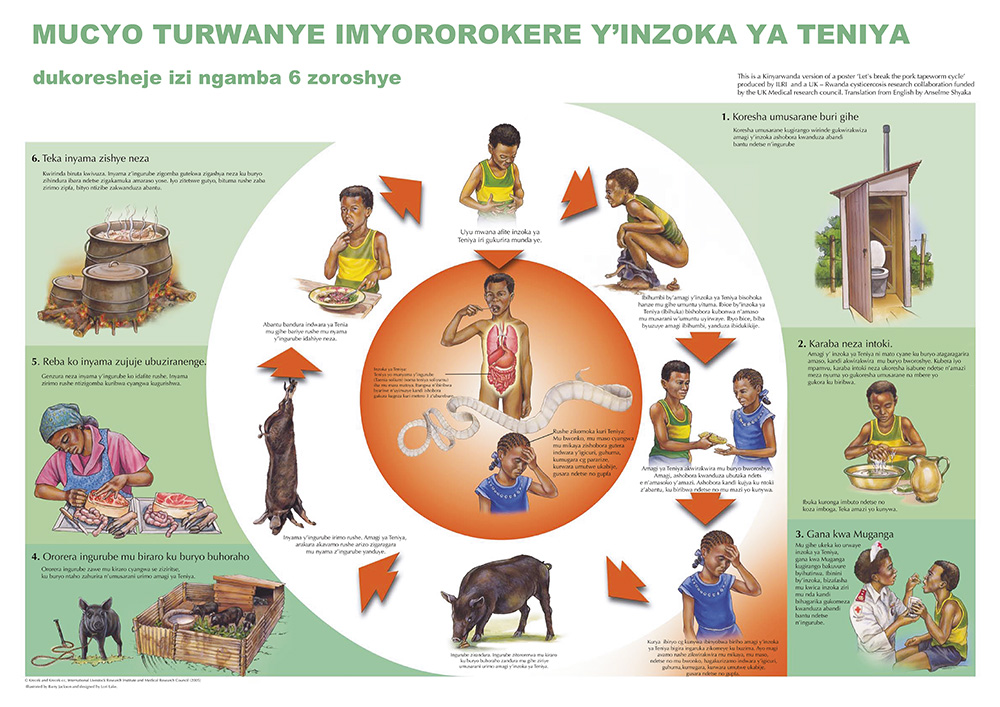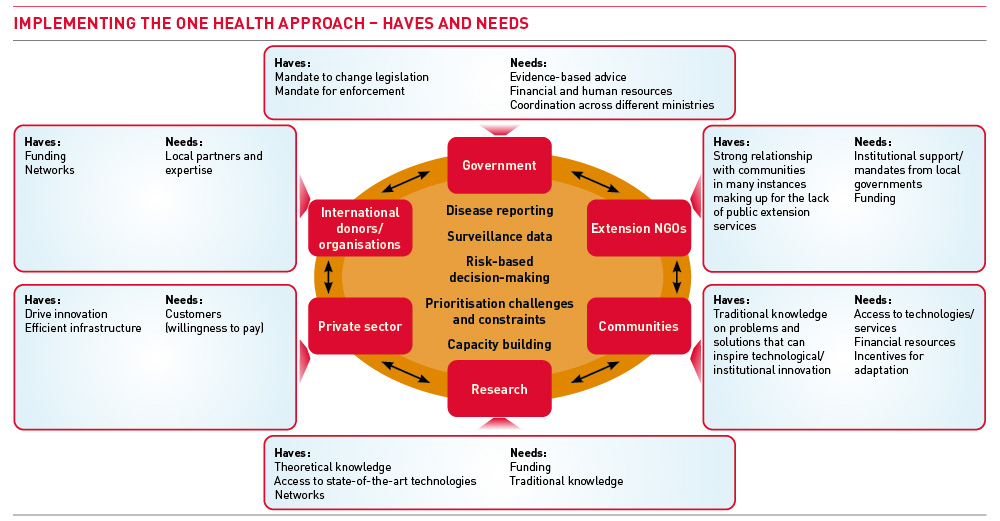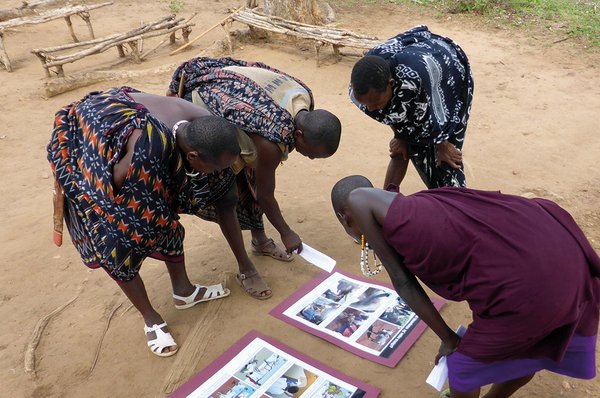 Download this article in magazine layout
Download this article in magazine layout
- Share this article
- Subscribe to our newsletter
Towards better livelihoods of livestock-keeping communities
The International Livestock Research Institute (ILRI) and partners have followed and promoted a One Health approach for decades. While the core activities are research, the purpose of the research itself is to provide a scientific basis for sustainable changes for livestock-keeping communities in low- and middle-income countries. What is important here is that research does not only evolve around diseases transmissible between animals and humans but also focuses on sustainably increasing farm productivity for better livelihood and nutrition outcomes without contaminating or exploiting natural resources. This article is a small snapshot of examples from ILRI’s activities in sub-Saharan Africa. Similar approaches are used in the projects implemented in Southeast Asia.
Participatory approaches in research with communities
For us, capacity development and dissemination already start at the point of data collection. For more than 20 years, we have used participatory methods developed in social science to study zoonotic and non-zoonotic diseases. To eradicate rinderpest, participatory epidemiology has helped to sensitise communities, map hotpots of disease transmission and co-develop control options to eventually eradicate the disease.
Today, we use participatory methods to prioritise health issues relevant to the communities, identify patterns of disease occurrence (temporal-seasonal, cultural, economic) and determine how they relate to externalities such as animal movements or school terms. We discuss how these issues are currently managed in and by the communities, constraints on how to improve control measures, and how to improve adaptation of available solutions (the Box below shows an example). While researchers use the data gathered to discuss them with the scientific communities, the participants consider these activities as a training because they may otherwise never have come together with peers to discuss a certain topic of concern to the entire community. In terms of disease surveillance, researchers are enabled to identify health priorities without being too biased towards one focus disease. Participatory appraisals are coupled with prevalence studies or other surveys on disease agents. In the recent past, we have identified zoonotic diseases that had never been reported from countries before (e.g. diamond skin disease in pigs), or for which only anecdotal reports existed; or we have learned from the communities that there are many early warning signs of zoonotic diseases (e.g. sudden die-off of antelopes around water holes as a precursor for an anthrax outbreak).
A vaccine has been developed – now what?
Taenia solium, a tapeworm transmitted between pigs and people, has long been contributing to the health burden in poor, pig-keeping communities in Africa, Asia and the Americas. Humans harbour the adult worm and infect pigs and other people when they practise open defecation. Pigs and people develop cysts in muscle and brain tissue when ingesting the eggs from the environment. In pigs, these cysts do not cause much harm as they are usually slaughtered at the end of the growth period, and in most cases, an infection is not noticed until slaughter. In humans, however, Taenia solium cysts in the brain can lead to epilepsy and other neurological malfunctions. The adult worm can develop in humans when they ingest undercooked pork with viable cysts.
Recently a vaccine has been developed for pigs to avoid cysts developing at production and consequently preventing humans from getting infected. But farmers do not see the benefit of buying the vaccine because they do not receive more money for each kilogram of pork, even if it is “tapeworm-free”. The vaccine comes in a package with a dewormer; in case the pig already caught the infection prior to the vaccination, cysts are cleared from the system. This dewormer also kills other gastrointestinal worms that cause a pig not to gain as much as if it was free of worms. This is potentially the motivation for a farmer to consider buying this intervention package, as it will help him sell bigger pigs at a better price.
Reporting back to and reflecting with the communities
Part of the ILRI protocol on research ethics requires the researchers take the findings of studies back to the communities where the research was conducted. This mechanism ties good scientific practice with developmental impact because the communities (including their leaders) are more aware of potential health problems in their communities and potential implications for their livelihoods. This approach of community conversations has since been scaled nationally and in terms of conversation topics, such as antimicrobial resistance.
In 2012, the CGIAR Research Program on Livestock, led by ILRI, started implementing value chain-based programmes in Ethiopia (small ruminants), Tanzania (dairy), Uganda (pigs) and Vietnam (pigs). The first phase of the programme started by extensively mapping the value chains in focus, including their actors and stakeholders, identifying and quantifying health, economic and social burdens and discussing solutions (using participatory approaches). These included feeding animals (and the competition with human food resources), husbandry practices, access to service, knowledge and extension. Human health and nutrition aspects were covered by the CGIAR Research Program on Agriculture for Nutrition and Health through the Safe Food, Fair Food project (funded by Deutsche Gesellschaft für Internationale Zusammenarbeit – GIZ) which investigated foodborne zoonoses from farm to fork by leveraging the value chain approach. Thanks to the long-term intention of these programmes (ten years), it was possible to form strong bonds with communities, their leaders, the local public and the private sector (see Box below). In all of the countries where the programme was implemented, mobile phone-based and other multi-stakeholder platforms have been developed and are running.
Community conversations in the highlands of Ethiopia
Teams of the International Livestock Research Institute (ILRI) and the International Center for Agricultural Research in the Dry Areas (ICARDA), in collaboration with regional research centres and district development partners in Ethiopia, facilitated a series of community conversations on gender roles and sharing of workload, zoonotic diseases (e.g. boiling milk and cooking meat), livestock ownership and decision-making as well as access to information and extension services in 2018. Participants were guided through a set of reflective questions to capture and discuss their experiences and stories about the benefits of the conversations and the changes they had made individually and as a household, community or group. Beyond the discussions facilitated by the research teams, the participants took the messages learnt to their own community’s communication channels, such as bible study, groups, village savings groups, women’s groups, social gatherings and community meetings.
The district officials also reflected on their key learning: “We have been practising a top-down extension approach with a focus on technology not on people, but community conversations are the way we are supposed to do our work with the community […] that bring a change in attitudes and practices in the community. Since then we have started consulting women as well, which before had not been practice.”
mPig: Mobile SMS learning for pigs
Based on the findings from the assessment of pig value chains in Uganda, we developed a set of 15 messages for 800 pig farmers in one of the poorest pig-keeping community. Pigs are monogastrics like humans, and since many of the smallholder pigs are cared for by women (e.g. mothers), the sms (in local languages) included messages on good pig husbandry and welfare but also on human nutrition and good hygienic practices to avoid foodborne and other zoonotic diseases. These messages were extensively pretested, participants taught in the use of the phone, and an electronic platform was set up for automated messaging. Following the pilot intervention, we held group discussions with the users to identify constraints to the scaling of the intervention (e.g. varying literacy levels, inequity in phone use and phone networks, willingness to pay for the service, among others).
Tapping the research network to develop a business model for training in East Africa In Uganda, two of the assistants who facilitated the group discussions with pig farmers observed that knowledge dissemination was a true market gap. With the support of ILRI, training modules for pig farmers were developed, and the two entrepreneurs were awarded a stipend by the East Africa Agribusiness Innovation Incubator Programme, and learned how to develop a business plan and to organise and market their training programmes. While during the first rounds of trainings (in 2014), ILRI researchers helped facilitating, the trainings today are delivered solely through the two young entrepreneurs and the staff they have been able to recruit since then. Following registration with the Directorate of Industrial Training in Uganda, they are now training hundreds of farmers each year and are even travelling to Uganda from neighbouring countries.
Training from grassroot to policy level
One Health training at graduate level has long been integrated into the research conducted by ILRI and partners. Fellows are often staff of national research and government institutions, such as the Kenya Medical Research Institute, the Ethiopian Public Health Institute and the Ugandan National Animal Disease Diagnostics and Epidemiology Centre. These departments are embedded in the countries’ Ministries of Agriculture and/or Health and therefore directly benefit from working with ILRI (and other CGIAR centres) as they have access to state-of-the art technology and an international network.
Programmes such as the USAID-funded Africa One Health University Network (AFROHUN), the Afrique One-African Science Partnership for Intervention Research Excellence (ASPIRE) funded by the Wellcome Trust, the UK Aid-funded One Health Regional Network for Africa (HORN), and the Southern African Centre for Infectious Disease Surveillance (SACIDS) Foundation for One Health have developed modules for One Health training at the graduate level for the past decade and more. These pan-African training programmes will hopefully shape future leadership in One Health.
At policy level, engagement is more challenging due to limited human and financial resources that draw the attention to more urgent problems and away from long-term investments in strengthening health systems. Sharing resources and information across government departments is lacking, and this problem is hard to solve. Some countries, such as Kenya, spearheaded the process over time to collaborate more closely in human, livestock, wildlife and environment health through their zoonotic disease unit hosted at the Ministry of Health. In many other countries, the benefits of this collaboration have not been acknowledged yet or are difficult to implement. Similar to other partners in numerous countries, we are trying to engage political decision-makers by providing them short and less technical policy briefs and compilations of those or inviting them to planning and stakeholder meetings. In the wake of the Corona pandemic, many activities have successfully been shifted to virtual meetings enabling interested stakeholders in contributing and listening, such as the Community of Practice webinar series organised by the One Health Units for Humans, Environment, Animals and Livelihoods (HEAL) project.
At grassroots level, we still heavily depend on the government extension service, which is usually extremely underfunded and understaffed. Non-governmental organisations such as Vétérinaires sans frontières (VSF), the Foundation of Netherlands Volunteers (SNV), TechnoServe, Land O’Lakes and many others usually try to cover this gap with resources mobilised outside the African continent through donations or bilateral grants. In partnership with ILRI and Comitato Collaborazione Medica (CCM), VSF-Suisse is implementing the HEAL project in Ethiopia, Kenya and Somalia. The consortium is currently working on operationalising community-based One Health units, especially in pastoralist areas where access to extension services is even more inadequate. These units are meant to provide technical advice on human and animal health as well as rangeland and natural resource management. At the same time, they are expected to serve as a point of referral and surveillance, an interface between the pastoralist communities and the government.
The ILRI-led project “Boosting Uganda’s Investments for Livestock Development” (BUILD) project (funded by the German Development Ministry – BMZ) is a further example. It investigates (zoonotic) animal disease outbreaks jointly with the Ugandan Ministry of Agriculture and VSF-Germany. While researchers collect samples from animals (and humans), the extension NGO provides extension advise to affected farmers on how to detect, report and contain the disease. The data collected will be used for research on intervention options (such as which vaccine to use), but also to provide the government with decision-support tools (such as risk maps for disease hotspots in the country) and surveillance data.

Synergies and complementation for greater impact
In order to concentrate and disseminate One Health knowledge and take advantage of synergies, the ILRI-led, BMZ-funded One Health Research, Education and Outreach Centre in Africa (OHRECA) was founded in 2020. It aims to facilitate the exchange, complementation and sharing of knowledge and resources across sub-Saharan Africa. Building on more than 20 years of One Health research for development, we hope to bring all the initiatives mentioned above and beyond together towards a common goal.
Kristina Roesel is a scientist in the Animal and Human Health programme at the International Livestock Research Institute, based in Nairobi, Kenya. She joined ILRI in 2011 and currently heads a new ILRI-led BMZ investment on improving animal and human health in Uganda and helps in conceptualising the BMZ-funded ILRI One Health centre for Africa.
Kristina Roesel is a scientist in the Animal and Human Health programme at the International Livestock Research Institute, based in Nairobi, Kenya. She joined ILRI in 2011 and currently heads a new ILRI-led BMZ investment on improving animal and human health in Uganda and helps in conceptualising the BMZ-funded ILRI One Health centre for Africa.
Contact: K.Roesel@cgiar.org
References and further reading:
CGSpace: Community conversations on antimicrobial use and resistance [Ethiopia]
https://cgspace.cgiar.org/handle/10568/106395
CGIAR Research Program on Livestock
https://livestock.cgiar.org
AgHealth
https://aghealth.wordpress.com
Africa One Health University Network (AFROHUN)
https://afrohun.org
African Science Partnership for Intervention Research Excellence (Afrique One-Aspire)
http://afriqueoneaspire.org
ILRI: One Health regional network for the Horn of Africa
https://www.ilri.org/research/projects/one-health-regional-network-horn-africa
Southern African Centre for Infectious Disease Surveillance
http://www.sacids.org
CGSpace: Food safety and informal markets: Animal products in sub-Saharan Africa
https://cgspace.cgiar.org/handle/10568/42438
CGSpace: One Health for Humans, Environment, Animals and Livelihoods (HEAL): Community of Practice
https://www.oh4heal.org/community-of-practice/
One Health 4 HEAL
https://www.oh4heal.org/heal/
CGSpace: Community conversation facilitators training workshop: Training material and facilitation guide
https://cgspace.cgiar.org/handle/10568/107025
CGSpace: Going to scale with community conversations in the Highlands of Ethiopia
https://cgspace.cgiar.org/handle/10568/105817
CGSpace: PPM’s (Pig Production and Marketing, Uganda) involvement in capacity development of pig value chain actors and scaling out of interventions
https://hdl.handle.net/10568/81320





Add a comment
Be the First to Comment